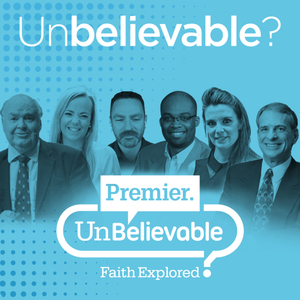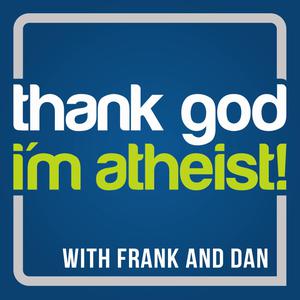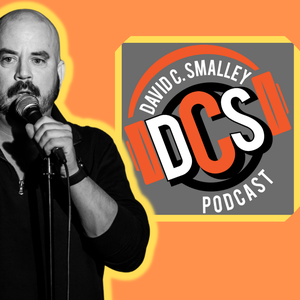
Humanize Me
Bart Campolo
A podcast about making the most of this life by reframing your story, building better relationships, and cultivating wonder and gratitude. Hosted by longtime counselor and community builder Bart Campolo, the show features warm, thoughtful conversations about generating love and meaning in a universe that doesn’t always provide it.
- 55 minutes 50 seconds909: It's time to say goodbye, for now
Dear Friends,
Almost 10 years ago, I recorded the first episode of The Wonder-full Podcast, which turned into Humanize Me the following year. Over the course of the roughly 230 episodes that followed, you and I have enjoyed talking to scientists, artists, community builders, influencers, authors, and each other about how to make the most of this life by building loving relationships, cultivating our senses of wonder and gratitude, and making meaning by making things better for other people. Frankly, engineering that shared journey with my dear friend John Wright has been one of the greatest privileges of my life. So then, I think it is quite fitting that in this final episode, John helps me explain why that journey must come to an end.
What is impossible to explain, I’m afraid, is the deep gratitude I am feeling for each and every one of you listeners, and especially to those who have actively supported the podcast with your encouragement, ideas, and financial support. As you’ll hear, both John and I hope this isn’t the last time we dust off our mics and fire up that Humanize Me theme song, but in the meantime we want you to know that the podcast feed with all its episodes, along with the website, social media accounts and Facebook Group will all stay live, so that old friends can come back for a visit and folks like us can stumble onto our kind of hope. To that end, we've pulled together a short list of all-time favorites at HumanizeMePodcast.com.
Please feel free to reach out to me at BartCampolo.org if you’ve got a question or a story, or just want to share what the podcast has meant to you. Rest assured, I’ll be thrilled to hear from you. After all, my ankles are creakier, my public profile is lower, and my wee bit of hair is seriously gray, but my commitment to building and maintaining humanizing connections hasn’t waned a bit. Thank you so much for listening to John and me over these years. One way or another, I have a hunch we’ll see you again… on Humanize Me.
Much love,
Bart
13 September 2024, 2:35 pm - 1 hour 25 minutes908: Life After Doom, with Brian McLaren
Brian McLaren's new book defines 'doom' as, "The psychological sense that we know our problems are bigger than our solutions." In this episode, he and Bart talk about their fears for the future, a potential collapse in our way of life, how they think about 'hope', and what kinds of things are likely to help people in the worst-case scenarios.
As Brian warns in his book, this is not a conversation for those who aren't already in a fairly secure place emotionally or psychologically.
15 July 2024, 11:48 am - 57 minutes 45 seconds907: What are the limits of our commitments to others?
"Bart, in your episode with Devin Moss you mentioned envying his role as a humanist chaplain for someone on death row, because he could throw himself into totally being there for that man, knowing it was only for a limited amount of time. That sounded easier to you than committing to love a needy person with lots of life ahead of them. That one strange comment has raised a lot of questions for me: Do we really have to be there for someone throughout every stupid thing they do? Why can't we just be there for an episode or two and then move on? Why can't somebody else step up once in a while? ... Obviously, we all have limited amounts of time, energy and emotional capacity. Essentially, I guess I'm asking: what do you think are the limits of our responsibilities to others?"
Bart and John discuss.
28 June 2024, 4:43 pm - 1 hour 16 minutes906: The 'Nothing in Particulars', with Pew's Alan Cooperman
Those whose answer to their religion is 'Nothing in particular' make up an increasing number of the population of the United States. They're part of a larger group of 'nones' who differ in many ways, even among each other. In this episode, Bart dives into the most recent data with Alan Cooperman from the Pew Research Center, who talks about religious trends in America, behavior of religious groups, levels of engagement with group organization of various kinds, and how an increase in isolation may play a part. If you're most interested in the data itself, we start to get into the nitty gritty around 15 mins into this episode.
10 June 2024, 11:24 pm - 1 hour 22 minutes905: A humanist chaplain and a death row inmate, with Devin Moss
Devin Moss is a media producer who became a humanist chaplain during the pandemic and surprisingly quickly found himself ministering to a death row inmate called Phillip Hancock. He was there in Hancock's final moments, a story he tells in this New York Times Magazine article, plunging him into the question of what it really means to face death without God.
23 May 2024, 3:31 pm - 1 hour 3 minutes904: Cosmogenesis, with Brian Swimme
Brian Swimme is an evolutionary cosmologist whose latest book, Cosmogenesis, is autobiographical, but is also an attempt to tell the story of the universe as science knows it, placing human beings inside the story. Brian believes that, properly told, the story is awe-inspiring, beautiful and unifying, and potentially a foundation for a better world. In this episode, Bart tries to understand Brian's work, and how he seeks to 'turn others on' to what inspires him about our universe.
20 April 2024, 1:45 pm - 1 hour 9 minutes903: Getting to know a listener from scratch
In the last of three episodes on 'high disclosure relationships', Bart gets to know someone in depth from scratch - a Humanize Me listener called Patti, who turns out to be as wonderful as we could have hoped - and in the process, provides an example of such conversations to inspire you to do the same.
8 April 2024, 6:18 pm - 42 minutes 49 seconds902: A tool for connecting with someone
Bart shares a tool he's used often to connect with people in the manner discussed in episode 901 with Rich Slatcher.
6 March 2024, 10:16 am - 1 hour 22 minutes901: The power of self-disclosure in relationships, with Rich Slatcher
Rich Slatcher is a psychologist who is the current Gail M. Williamson Distinguished Professor in the Behavior and Brain Sciences area of the Department of Psychology at the University of Georgia. In this conversation with Bart Campolo, he talks about the power of self-disclosure in relationships, and the other factors which draw people closer to each other.
30 January 2024, 11:44 pm - 1 hour 51 seconds820: Doing the next right thing - a list
There’s doom and gloom in the ether, and many people aren't feeling too great about the world. What to do?
Bart thinks the best move is to swing to the stoics, with a sense of separating what we can control versus what we can’t. Simply 'doing the next right thing'. Some things we can control: our next moves, our vote, our transactions, the ways we communicate, the protections we give our children, and what we pay attention to.
To the point of what we pay attention to, Bart has a list of recommendations for some content on the theme of doing the next right thing, along the lines of some of the lists often shared in the media around this time of year. These are the podcasts, TV shows, movies and songs mentioned in this episode:
- Invisibilia: 'An Unlikely Superpower'
- Radiolab: 'From tree to shining tree'
- The Last of Us: 'Long, Long Time'
- This is Actually Happening: 'What if you witnessed a thousand deaths?'
- The Bear: 'Forks'
- Reservation Dogs: 'Frankfurter Sandwich'
- Kristen Bell: 'The Next Right Thing'
We'll have one more episode this year for patrons of the show at Patreon.com/HumanizeMe. And with that, from us, a happy new year! See you in 2024.
14 December 2023, 8:13 pm - More Episodes? Get the App
Your feedback is valuable to us. Should you encounter any bugs, glitches, lack of functionality or other problems, please email us on [email protected] or join Moon.FM Telegram Group where you can talk directly to the dev team who are happy to answer any queries.
 The Michael Shermer Show
The Michael Shermer Show
 Straight White American Jesus
Straight White American Jesus
 Unbelievable?
Unbelievable?
 TheThinkingAtheist
TheThinkingAtheist
 Thank God I'm Atheist
Thank God I'm Atheist
 David C. Smalley
David C. Smalley